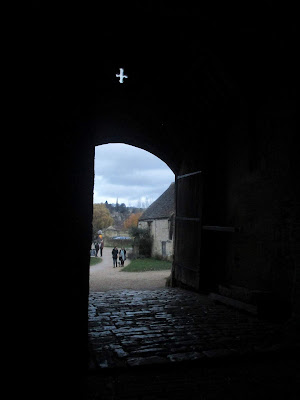Armistice Day saw the
end of the Great War and the beginning of my grandparents' marriage. To mark the 100th anniversary of both, and also the 121st birthday on 18th November of my lovely,
free-spirited grandmother, Hilda Florence Mary Hill, I'm posting an extract from 'Nanny 1897 – 1991
An Uncommon Woman', which my uncle, Noel Hill, wrote for her friends,
her ten surviving children, and their children and grandchildren after her
death.
Hilda Florence Mary Drewett, aged about 13
Nanny worked for several employers, but latterly and mostly for a Professor
Dobson of the University
of Bristol. Her earlier employers were hard and
inconsiderate. Her first job entailed
dawn-to-dusk working for two shillings and sixpence (12½ pence) per week. Even Nanny's lifetime habit of singing whilst
she worked brought trouble onto her head.
The lady of the house was herself taking singing lessons, and hearing
Nanny singing as she scrubbed the nursery stairs, declared 'How dare you sing
one of my songs, I have paid good money to learn that!'
It wasn't only her employers' songs that Nanny borrowed. Frequently raiding their libraries, she was
and remained an avid reader, anxious to improve herself, often reading far into
the night by candlelight. She was also a
great correspondent, writing letters to all and sundry in a good, plain, round
hand, in lucid and graphic style. In her
apron pocket Nanny invariably carried a few scraps of paper and a pencil, and
would note down her thoughts and observations on life in verse. Copied out in exercise books, they were her
most treasured possessions and survived her death to speak to us of her concern
for all around her.
Nanny's second job was at Weston-Super-Mare, some twenty miles from the
parental home, but when her mother heard that a regiment of Australian soldiers
was about to be billeted there, she attempted to recall Hilda to Bristol, where
a better eye might be kept upon her.
This endeavour appears to have had little success for despite the
constraints of a living-in job, Nanny seems to have surmounted them quite
literally by climbing in and out of her bedroom window, sometimes wearing her
mistress's clothes. Her great friend and
cousin-in-law Kate often spoke of the Saturday evening during the Great War
when she encountered a haughty-looking Hilda, wrapped in a magnificent fox fur
cape, sweeping past on the arm of an army officer and being greeted with a
well-articulated 'Good evening, Kate, and how are you?' 'And she without a stitch of her own clothes
on her back!' Kate would declare.
William John Hill
There was a young pilot, a tall Australian soldier and a magnificent Scotsman,
photographed for her in his kilt. But
most of all there was the quiet, dark dispatch rider in the Gloucester regiment, William John (Jack)
Hill. Not that he had everything his own
way. After one rejection and in an
effort to meet the competition, Jack came home on leave resplendent with a brand
new moustache, to be told that if he went home immediately and shaved off that
awful thing above his mouth, Nanny would consider walking out with him
again! Shortly after they were engaged,
and then Nanny heard from the Scotsman.
We can gather that the removal of his moustache was not the only close
shave Jack Hill had when we read the little verse Nanny wrote at the time.
'I
could have loved you a long time ago
And could have said it
But
you went away – a long way away.
When
you came back it was too late –
And
love was a forgotten word
Remember?'
Jack and Hilda were married by special
licence at St Michael and All Angels in Bishopston two days before Armistice
was declared on 11th November 1918.
Their brief honeymoon was spent at The Royal Oak, Clevedon, a pub owned
by one of Jack's uncles, who was also a fisherman. The newlyweds' first breakfast consisted of a
huge skate which Uncle Joe had caught and which he declared to be very good for
fertility. In later years, Uncle Joe
undertook to buy each of Jack's children a pair of shoes at Christmas, and as
the numbers grew and his bill for shoes increased, Uncle Joe would suck deeply
on his pipe and mutter that if he had had any sense at all he would have thrown
that bloody skate back in the Severn!
My grandmother with her triplets, 1939
The Hill family, 1940




















































































